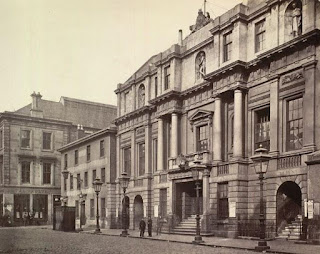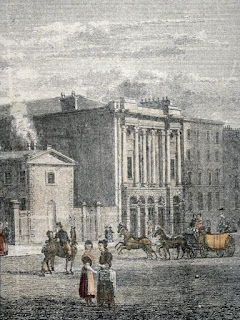Exit Stage left. (1)
On the 24th April, 1595, the Kirk-Session of Glasgow directed the town's drummer to forbid " all persons from going to Ruglen to see vain plays on Sundays-.'" ; - On the 2Oth May, 1624, the session gave public intimation- 'that all "resetters of comedians would be severly punished" And on the 2Oth July, 1670, the Magistrates of Glasgow- "interdicted strolling stage players from running through the streets, and from performing plays in private houses," which they called "The Wisdom of Solomon." "The Presbytery," writes Mr. Arnot in his interesting book - " were possessed with the most violent and the most illiberal animosity against the stage. The writings of their most popular divines represented the playhouse as the actual temple of the Devil, where he fre- quently appeared clothed in a corporeal substance and possessed the spectators, whom he held as his worshippers.''
In theological Scotland, where belief in demonology and witchcraft was so slow in dying, such stories were currently believed. The rage against the "Temple of Beelzebub," as the theatrical entertainments were styled at that period, was stronger by far north of the Tweed than in England, and the drama consequently made far slower progress in North Britain than it did elsewhere.
Parties were formed who nightly patronised entertainments in order to vindicate the right of public opinion, and at the same time to protect the actors themselves from personal violence, with which they were threatened.
Scottish actors at that period, in order to defend themselves from the violent measures adopted against them, were obliged to register themselves not as actors but as menial servants to some of their noble patrons. It was not an uncommon thing for a tragedian at this period to be received into a nobleman's house as his butler, and after playing Richard the Third upon the stage, to act the part of " Scrub " off it, by drawing a cork at his lordship's side table.
No man of repute at that period would aid either by his name or his purse in the erection of a playhouse. No builder would build a theatre, nor could he, if so inclined, have found workmen to carry on the work. Even the accommodation of a roof was looked upon by the wary landlord as too great a hazard ; for the owner was assured by his zealous pastors that the devil would be personified beneath it, and that the whole fabric would vanish away in a flame of fire.
No city was at the time more imbued with religious fanaticism than Glasgow, and no wonder ! Many of its best citizens had risked not only their fortunes but their very lives in support of Presbyterianism against Popery, and this, long before the days of William of Orange or even those of the first Charles.
Anything which tended to please the eye, charm the ear, or steal upon the senses, was looked on as in some way related to Romanism. Thus all plays were abandoned. The beams of that brighter sun which shone on England with the accession of William of Orange did not for years, pierce the darkness and gloom which an austere theology had cast over Scotland.
What theatrical (?) entertainments had been given in Scotland up to that period had partaken more of the style of our present " Variety " stage. The com- pany had consisted solely of bands of strolling players, tumblers, acrobats, singers, dancers, and performers on the tight rope. The chosen haunt in Glasgow for such performances up to 1750 was " Burrell's Close." This was a passage which led out eastward from Duke Street, and at the end of which was a public hall accessible by a narrow staircase.
Mr. Daniel Burrell, the proprietor of this hall, was a dancing master who had in 1738 been invited by the civic authorities to come and teach " the poetry of motion " in Glasgow. The art had been imported from London by the upper classes, the Duchess of Gordon having been the chief patroness. But Mr. Burrell had not driven a thriving trade. He required the aid and guarantee of the Corporation in the shape of an annual salary of £20 to enable him to carry on his profession. His fees were comparatively moderate, 25s. being the sessional one for seven months, 5s. for a Ball, and 1s. for practising for it under his supervision.





Comments
Post a Comment